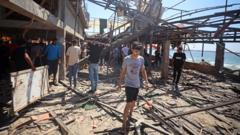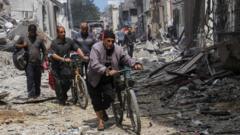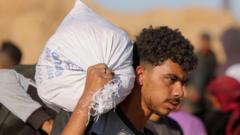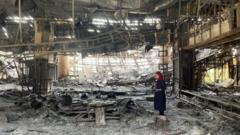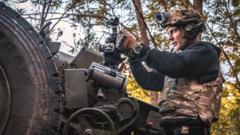In the beleaguered city of el-Fasher, Sudan, the profound human toll of civil war is captured through the testimonies of three young individuals—Hafiza, Mostafa, and Manahel—who detail the losses, struggles, and fears faced amid relentless attacks and humanitarian crises. Their accounts, shared via BBC smuggled phones, illuminate the desperate realities of life in a city under siege, where basic necessities are becoming increasingly scarce.
Voices of Despair: Sudan's Ongoing Nightmare from Within a War Zone

Voices of Despair: Sudan's Ongoing Nightmare from Within a War Zone
As Sudan grapples with a devastating civil war, affected civilians bravely share their harrowing stories through smuggled phones.
In el-Fasher, Sudan, a city convulsed by violence, the once vibrant lives of its residents have been shattered forever due to the ongoing civil war that erupted two years ago. The conflict, primarily between the Sudanese Army and the paramilitary Rapid Support Forces (RSF), has left countless families in despair, struggling to survive amid relentless bombardments and acute food shortages.
Hafiza, a 21-year-old whose mother was killed in a shelling incident, poignantly shares her heartbreak as she takes on the responsibility for her younger siblings. "She left no last words. She was dead when she was carried away," she recalls, describing the moment that forever altered the course of her life. With her father deceased prior to the war, Hafiza is now navigating the profound grief of loss while attempting to provide for her five-year-old brother and two teenage sisters amid the chaos that engulfs their home.
El-Fasher has been largely cut off from contact with the outside world for a year, with humanitarian reports and journalistic access severely restricted. Through the smuggling of phones, the BBC has enabled residents to document their struggles. In one of Hafiza's messages, she expresses her feelings of despair: "I spend my time crying alone at home." Her attempts to survive involve volunteering at local shelters, providing blankets and food to displaced individuals as the city grapples with a looming famine.
Mostafa, another el-Fasher resident utilizing a BBC phone, reports on the harrowing sound of artillery shelling that has become a constant in his life. "There is no safe place in el-Fasher… Death can strike anyone, anytime," he states. His own home was devastated by a shell, and he now often witnesses the aftermath of RSF attacks on civilian areas. As conditions deteriorate, clean water has become a rarity, forcing many to drink from contaminated sources.
Manahel, a recent university graduate, has also shared her story, highlighting the collective trauma experienced by her community. Her family recently relocated to a safer area as the RSF moved closer to their home, yet they lost her father to an RSF artillery strike. "You lose your home, everything you own…" she expresses, adding to the growing fear among civilians of potential atrocities, particularly against women and marginalized communities.
The international community remains critical of both combating factions, with numerous accusations of war crimes levied against the RSF, including allegations of ethnic cleansing. Such fears resonate deeply with Hafiza and Manahel as they reflect on the turbulent history of violence in Darfur, where acts of brutality have scarred countless lives.
As the conflict continues—with the RSF currently controlling strategic areas—the gloomy fate of el-Fasher's residents looms large. With their spirits resolutely tested, Hafiza, Mostafa, and Manahel ultimately fled the city in search of safety, resigned to an uncertain future.
"What will happen next? When will this war end?" Manahel questions, emblematic of the broader despair felt by millions in Sudan caught in this relentless cycle of violence and humanitarian crisis.

